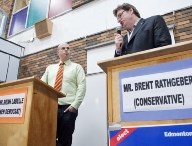Carly Fenske is a rare breed, statistically. The Paul Kane student is 18 and she plans to vote.
"I think it's a huge privilege to be allowed to vote in our country," Fenske said, and she's already picked a party to support. People who don't vote might expect the country to get better on its own, she said, but added, "If you don't step up and change it, it's not going to get changed."
Fenske was one of about 100 students that packed the Paul Kane High School atrium at lunch Thursday for the school's first-ever candidates' forum.
All four federal candidates urged the students to take part in this year's election. "This is the youth election," said Liberal candidate Kevin Taron in his opening address. "This is an opportunity for youth to stand up and say we believe in a strong Canada."
Tough questions
It was an open-mike forum, with moderators letting audience members pose questions directly to the candidates.
The first question was simple: what will you do for us if elected?
The Conservatives would continue to keep taxes low and create job opportunities for youth, said candidate Brent Rathgeber. "The issues of concern to youth are no different than the concerns of everybody else, which is the economy."
His party would also expand the Canada Student Loan program, he added.
The NDP planned to spend more on health and address the root causes of crime, said candidate Brian LaBelle, but "It's up to you guys to decide what you feel is most important."
The Greens would serve as the "conscience of Canada" if elected, said candidate Peter Johnston. "Our government under Stephen Harper is basically tiptoeing towards the American model and hoping nobody notices." The Greens would cut corporate tax cuts, invest in education, and press for a more sustainable society.
The Liberals would bring in a Canada Learning Passport, said Taron, which would provide all high-school students some $4,000 for post-secondary education if their parents open a Registered Education Savings Plan. "We want to reduce the burden of tuition costs on you."
They would also create a Youth Hiring Incentive — a three-year Employment Insurance break on every 18-to-25-year-old hired by a small or medium-sized business.
The candidates were united on the topic of gay marriage — it's legal, and they're fine with it. "We believe it's appropriate that consenting adults can make that kind of choice," Rathgeber said. "Our party has no plan to revisit that issue."
Taron noted that it was the Liberal party that legalized gay marriage. "It's here to stay."
On the topic of reaching out to new immigrants, Johnston said the Greens would do "all they could" to help immigrants find meaningful jobs. Taron called for a boost in family-class slots for immigration, while LaBelle said we needed to do more to teach Canadians about the cultures of new citizens.
Immigration is more complicated than the other parties make it out to be, Rathgeber said. The Canadian economy is still fragile and we have to balance the number of family-class immigrants we take in with economic ones.
The Conservatives have welcomed record numbers of immigrants, he said, but our priority has to be on skilled workers and temporary foreign workers — "those who contribute to the economy and pay taxes.
"Family re-unification, although important, will remain a lesser priority. I'm sorry to tell you that, but that's the simple reality."
Getting the vote out
Canadians voted in record low numbers in the last federal election, according to Elections Canada, with just 58.8 per cent marking a ballot. Just 37.4 per cent of people aged 18 to 24 voted, compared to 68.4 per cent of those aged 65 to 74.
Federal parties needed to make it easier for young people to understand the issues and how to vote if they want a better turnout, said Kayla Wood, an undecided student voter at the forum. "I think it's awesome how [the candidates] are here to educate us about it."
Facebook and Twitter are great ways to get the word out. "It's just so much faster," and it's a big help to anyone who can't make it to a forum.
Fenske wasn't as pleased with this election's emphasis on social media. "It's becoming very impersonal," she said. Twitter can publicize events, but doesn't let you get emotion across — just emoticons. "Try talking with each other instead of just hoping technology is the way of getting ideas across," she suggested.
Neil M. Ross Catholic School will host another all-candidates' forum on Monday at 10:30 a.m. Vincent J. Maloney Junior High has one planned for 11:15 on April 28.
The St. Albert Chamber of Commerce forum is at the St. Albert Inn at 7 p.m. Thursday, April 21.




